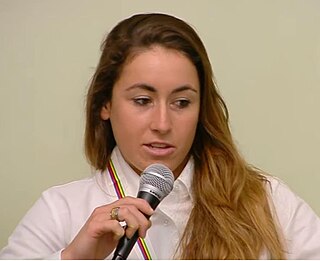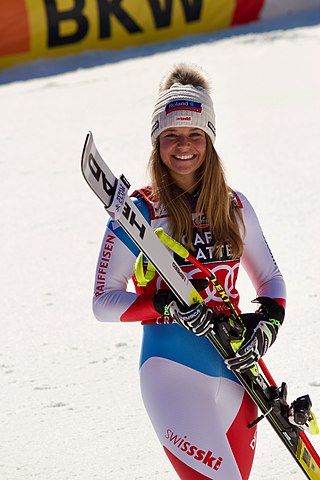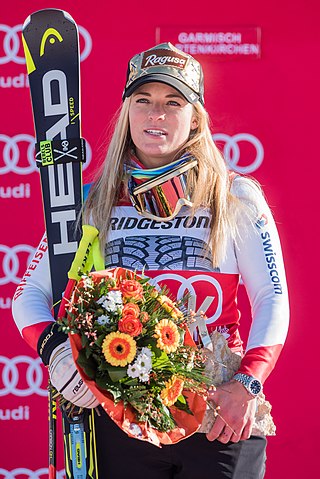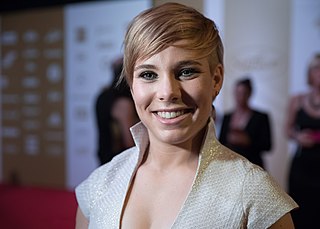
Sofia Goggia is an Italian World Cup alpine ski racer who competes in all disciplines and specialises in the speed events of downhill and super-G. She is a two-time Olympic downhill medalist — gold at the 2018 Winter Olympics, the first one for an Italian woman — and four-time World Cup downhill title winner.

The women's downhill in the 2021 FIS Alpine Skiing World Cup consisted of seven events. The original schedule had called for eight downhills, but the World Cup finals race was canceled.

The women's super-G in the 2020 FIS Alpine Skiing World Cup involved 6 events, which produced six different winners from five different countries.
The women's super-G competition of the Beijing 2022 Olympics was held on 11 February 2022 on the "Rock" course at Yanqing National Alpine Ski Centre ski resort in Yanqing District. Lara Gut-Behrami of Switzerland won her first gold medal, confirming her status as a defending world champion. Mirjam Puchner of Austria became the silver medalist, winning her first Olympic medal, and Michelle Gisin of Switzerland won bronze.

The International Ski Federation (FIS) Alpine Ski World Cup was the premier circuit for alpine skiing competition. The inaugural season launched in January 1967, and the 2021–22 season marked the 56th consecutive year for the FIS World Cup.

The women's giant slalom World Cup 2021/2022 consisted of 9 events including the final. Overall World Cup leader Mikaela Shiffrin from the United States, who started out in the early lead in this discipline, contracted COVID-19 at the end of 2021 and missed the post-Christmas giant slalom, then Shiffrin lost the lead in this discipline to Sara Hector of Sweden in the first race in 2022.

The women's downhill in the 2022 FIS Alpine Skiing World Cup consisted of nine events including the finals. Defending champion Sofia Goggia of Italy, who won four of the five downhills in which she competed in 2020–21, continued her domination in 2021–22 by again winning four of the first five downhills. Goggia took a commanding lead in the discipline after American Breezy Johnson, who finished second in each of the first three downhills, missed the rest of the season with a knee injury. Goggia then suffered her own knee injury, including a broken bone and ligament tears, while training for the last downhill prior to the 2022 Winter Olympics, but she was able to continue competing within a month and, after all but the final race of the season, had such a commanding lead that only one other competitor even had a theoretical possibility of overtaking her. At the finals, Suter failed to score, and Goggia won her second consecutive discipline championship.

The women's overall in the 2022 FIS Alpine Skiing World Cup consisted of 37 events in 5 disciplines: downhill (DH), Super-G (SG), giant slalom (GS), slalom (SL), and parallel (PAR). The sixth discipline, Alpine combined (AC), had all of its events in the 2021–22 season cancelled due to the continuing schedule disruption cased by the COVID-19 pandemic, which also happened in 2020-21. In an adjustment that was partially motivated by the pandemic, each of the four main disciplines had nine races, while the parallel discipline had only one. The season did not have any cancellations.

The men's downhill in the 2022 FIS Alpine Skiing World Cup included eleven events including the final. A scheduled downhill on 5 December 2021 at Beaver Creek, Colorado was cancelled due to bad weather, but after several abortive attempts to run it at other venues, it was finally added to Kvitfjell on March 4, the day before the previously-scheduled race.

The men's super-G in the 2022 FIS Alpine Skiing World Cup consisted of seven events including the final. A race originally scheduled for Lake Louise in November and then rescheduled to Bormio in December was cancelled twice and was thought unlikely to be rescheduled, potentially reducing the season to six events. However, the race was rescheduled to Wengen on 13 January 2022. After this race, 2016 champion Aleksander Aamodt Kilde of Norway had won three of the five completed races and led the discipline; two other races were within 100 points of his lead, although no one was closer than 60 points behind. Kilde then clinched the discipline championship for the season in front of a home crowd by winning the next-to-last race of the season in Kvitfjell.

The International Ski Federation (FIS) Alpine Ski World Cup is the premier circuit for alpine skiing competition. The inaugural season launched in January 1967, and the 2022–23 season marks the 57th consecutive year for the FIS World Cup.

The women's downhill in the 2023 FIS Alpine Skiing World Cup consisted of nine events, including the final. The original schedule called for eleven events, but the first two races of the season scheduled for 5 and 6 November 2022 in Zermatt/Cervinia, were canceled due to adverse weather conditions; the FIS decided not to reschedule them. Once the season began, a downhill scheduled in St. Anton on 14 January had to be converted into a Super-G due to the inability to hold a pre-race training run on either of the two days prior to the downhill. However, a subsequent Super-G scheduled at Cortina d'Ampezzo was converted into a downhill, restoring the original schedule.

The women's super-G in the 2023 FIS Alpine Skiing World Cup included eight events, including the final. The original schedule called for nine events, but a scheduled downhill at St. Anton on 14 January was converted to a super-G due to the inability to hold pre-race practice runs on either of the two days prior to the event. A later super-G at Cortina was converted into a downhill to restore the original schedule balance, but then a downhill at Crans Montana on 25 February had to be delayed a day due to fog and dangerous course conditions, and the super-G previously scheduled for that day was cancelled and not rescheduled.

The men's super-G in the 2023 Alpine Skiing World Cup consisted of eight events, including the final. The season was originally planned with eight races, but two were cancelled early in the season and were not planned to be rescheduled. However, when two races planned at Garmisch-Partenkirchen on 28-29 January 2023 were cancelled due to a lack of snow, the two previously-cancelled Super-G races were rescheduled on those dates at Cortina d'Ampezzo, restoring the original Super-G schedule plan.

The women's downhill in the 2019 FIS Alpine Skiing World Cup involved eight events, including the season finals in Soldeu, Andorra. Defending discipline champion Sofia Goggia of Italy fractured her ankle prior to the start of the season and missed five of the eight events, ending her chances to repeat. In addition, 2018 runner-up Lindsey Vonn of the USA, who had closed the prior season by winning all of the final four downhills and needed only four more victories to equal Ingemar Stenmark's all-time World Cup victory record, began the season injured and announced her planned retirement at the end of the season, but was hampered during her comeback by her cumulative injuries, and finally retired immediately after the conclusion of the 2019 World Ski Championships.

The women's downhill in the 2018 FIS Alpine Skiing World Cup involved eight events, including the season finale in Åre, Sweden. Before the start of the season, defending discipline champion Ilka Štuhec of Slovakia suffered a season-ending injury. Ultimately, the discipline title ended up as a battle between oft-injured eight-time discipline champion Lindsey Vonn of the USA and rising Italian skier Sofia Goggia. Through five races, Goggia had a 63-point lead over Vonn, who had been hampered with an injury at the start of the season. Vonn won all of the last three races, earning 300 points. .. but Goggia finished second in all three, earning 240 points, to hang on to a three-point victory for the season title.

The women's downhill in the 2024 FIS Alpine Skiing World Cup consisted of eight events, including the final. The tentative schedule called for eleven events, but a new event, the team combined, which was scheduled for 16 February 2024 in Crans Montana, was cancelled and converted into an additional downhill on the final schedule, increasing the planned schedule to twelve. However, as discussed below in the season summary, cancellations reduced that number during the season. The season champion was Cornelia Hütter of Austria, ending a string of three straight season triumphs by Sofia Goggia of Italy, who was injured just after the midpoint of the season but still finished third.

The women's super-G in the 2024 FIS Alpine Skiing World Cup consisted of nine events, including the final. One super-G on 10 December in St. Moritz was canceled, but it was rescheduled as a second super-G in Zauchensee on 12 January. As discussed in the season summary below, three more cancellations took place during February, reducing the season to eight races, but one downhill was then converted to a super-G to produce the final total of nine.

The women's downhill in the 2025 FIS Alpine Skiing World Cup is scheduled to consist of eight events, including the final. After the elimination of the two downhills scheduled in November on the "Gran Becca" course on the Matterhorn from the 2025 schedule, the first race of the season in this discipline is now scheduled to take place on 14 December in Beaver Creek, Colorado, United States.

The women's super-G in the 2025 FIS Alpine Skiing World Cup is scheduled to consist of nine events, including the final. The discipline opened for the season on 15 December in Beaver Creek, Colorado, United States.














